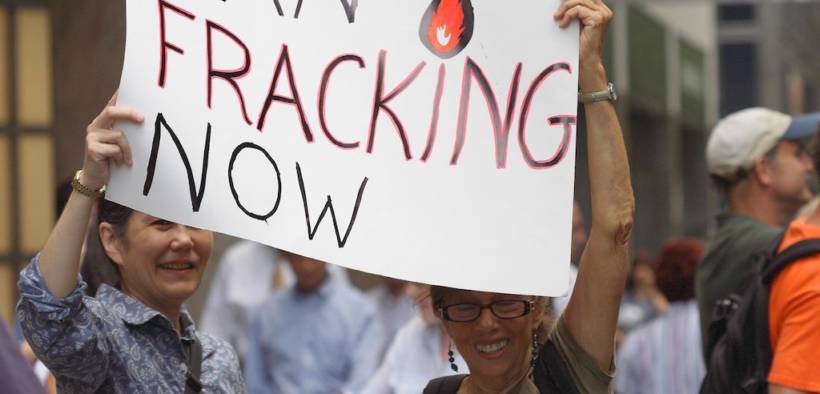How Fracking Bans and the Anti-Fracking Movement are Staring Down an Uphill Battle

In May Washington state joined New York state, Vermont and Maryland in passing fracking bans. Of these four states Maryland is the only one that has known oil and gas reserves.
According to the U.S. Geological Survey (USGS), “Hydraulic fracturing, informally referred to as ‘fracking,’ is an oil and gas well development process that typically involves injecting water, sand and chemicals under high pressure into a bedrock formation via the well.” The process allows more oil and natural gas to flow to the well from the rocks, and has been used since the late 1940s. It’s becoming more common, and the majority of new wells being drilled are fracked but it has also sparked a movement of concerned environmentalists pushing to pass fracking bans across the country. Current battles over fracking in Florida and Michigan underscore the challenges that activists face in their work to ban fracking.
Fracking’s impact on groundwater and drinking water near the wells has been debated for more than a decade. Videos of people who live near fracked wells lighting their tap water on fire have circulated since at least 2011 and have helped fuel anti-fracking backlash. Proponents claim that these instances are the result of improper fracking, which they say accounts for only a small fraction of fracking operations. In 2016 a former EPA scientist proved conclusively that fracking polluted the groundwater in Wyoming, and since then the anti-fracking movement has picked up momentum.
Anti-Fracking Movements
Two new states Florida and Michigan have potential fracking bans on the horizon. On Nov. 4 a bill to ban fracking in Florida cleared its first hurdle and was unanimously passed by the Senate Environmental and Natural Resources Committee. Florida has a number of oil and gas wells and offshore platforms, but no fracking at the moment. Oil and gas production in the state has been in decline for several decades.
Supporters of the fracking ban cite the environmental risks of fracking, especially given the state’s unique geological makeup. The vice president of oil and gas company Maverick Natural Resources opposed the bill. Florida Governor Ron DeSantis is opposed to fracking, but the bill has to make it through two more senate committees and then the Florida house before it reaches his desk. A similar measure stalled last year due to Republican opposition.
Michigan’s fracking ban faces an even greater uphill battle. According to Michigan’s Department of Environment, Great Lakes and Energy’s web page on fracking, “This method of well completion has been occurring in Michigan for over half a century where more than 12,000 wells have been hydraulically fractured.” The Committee to Ban Fracking in Michigan first tried to get a constitutional amendment to ban fracking on the ballot in 2012 but fell short of the required number of signatures.
After several other unsuccessful efforts, it seemed the group had enough support to get the measure on the ballot in 2018, but despite recording 270,962 signatures in support of the petition, many of the signatures were deemed invalid by the state due to a reference to the 2016 election.
“The disputed sentence on the front of the petition states that the proposal ‘is to be voted on in the November 8, 2016 General Election.’ Similar statements on other petitions have likewise not fully described or inaccurately described what would happen to a proposal after petitions are filed. Some have stated an election date, and then no election is held because the Legislature enacts the proposal,” explains a press release from the Committee to Ban Fracking in Michigan.
The group adds that when the signatures were brought forward it was “well before” the deadline for the 2020 statewide election. Yet the fracking petition was rejected and on Nov. 4 the group filed a brief in the state’s appeals court to get the measure on the 2020 ballot.
But even if the fracking ban makes it on the ballot, there is no guarantee the ban will pass. The oil and gas industry and related fields are important economic contributors in Michigan. Unlike other states where bans have passed, this will mean shutting down existing fracking operations.
More Challenges Ahead for Fracking Bans
Whether or not Michigan’s ban passes, the fight over fracking could get even more heated in 2020. On Jan. 1, 2020, a new rule by the United Nation’s International Maritime Organization (IMO) goes into effect that requires the international shipping fleet to drastically cut sulfur emissions. One way that shipping companies can comply is by switching to low sulfur fuels, and liquefied natural gas (LNG) is one option. Some ships have already made the switch and more LNG-powered ships will be launching during the next year. The increased demand for LNG is likely to increase prices and incentivize more fracking to extract the natural gas.
This could complicate the anti-fracking movement in a number of ways. Fracking bans may end up having a more substantial impact on shipping prices, fuel prices, U.S. fuel self-sufficiency, and the ability to mitigate air pollution from sulfur emissions.















